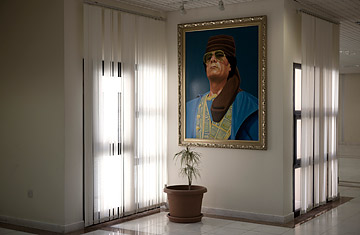
A portrait of Libyan leader Muammar Gaddafi hangs in Tripoli.
(2 of 2)
But some observers don't see how it could work. The rebels' transitional government holds that Gaddafi and his sons have to go. Watchers in Tripoli say Gaddafi would never accept such a deal. "The only way Gaddafi is going to leave power is in a sarcophagus," says one, who, like all other Tripoli residents against the regime, has insisted on anonymity. Still, he says, the situation is untenable.
As I spoke with shopkeepers during a recent, unscripted shopping trip to a middle-class Tripoli neighborhood, home to beneficiaries of Gaddafi largesse, many gave their leader a thumbs-up. Business is good, said one man at a cosmetics shop. His only complaint was that his air shipments of Italian and French beauty supplies have stopped because of the no-fly zone. Now he has to route them overland via Tunisia, a feat made more difficult by the lack of fuel.
At gas stations across the capital, lines stretch hundreds of cars long. Gasoline, which used to be cheaper than bottled water, is in increasingly short supply. Most of the oil fields and refineries are in the east. And many of the oil-tanker drivers, whose jobs are largely reserved for immigrant workers, have fled. In the agricultural areas on the outskirts of the city, produce lies rotting in the fields. The prices of basic food items have skyrocketed, prompting one young resident to say it is only a matter of time before people in Tripoli stand up in protest — not necessarily against the regime, but simply out of anger and frustration. "This false peace will not last," he says. "There is nothing to do here for the young. We have no movies, no bars and no clubs. So what do you do? Petrol is cheap, so you fill up your car, get some bootlegger whiskey and drive around. If the young can't do this, they will come to the streets."
And that, says the young Tripoli resident, would be a very dangerous situation. For several weeks, the government had a policy of arming citizen-protection squads. Anyone with a national ID, he says, could ask for a weapon from the pro-Gaddafi Revolutionary Corps. According to him, thousands of Kalashnikovs were handed out, and the result is a young, volatile and armed populace. "So if people come to the streets, it will be bad," he says. "They will be armed. And the security forces are armed."
So far, it has not come to that. More than anything, the capital's population appears to be settling in for a long wait. "We feed on rumors of success in the east," says the man who feared being hunted down by the military if he spoke out. "We know they may not be true, but they give us hope."
Yet news from the front is hardly reassuring. Heated battles in the town of Misratah underscore the difficulties faced by rebel forces. Despite their determination and the assistance of allied air strikes, they are outmatched by a well-armed and professional military. And at the pipeline-control station, Qa'oud inadvertently revealed another possible weapon in the government's arsenal: different parts of the water grid can be turned off at will by the central command. So far it has not turned off the spigots to the east — doing so might squeeze the rebels into submission, but it would also earn Gaddafi more ire from the international community. But if an air strike hits one of those 3,000 manholes and the network to the east is put out of commission, well, the international community was warned, wasn't it?
